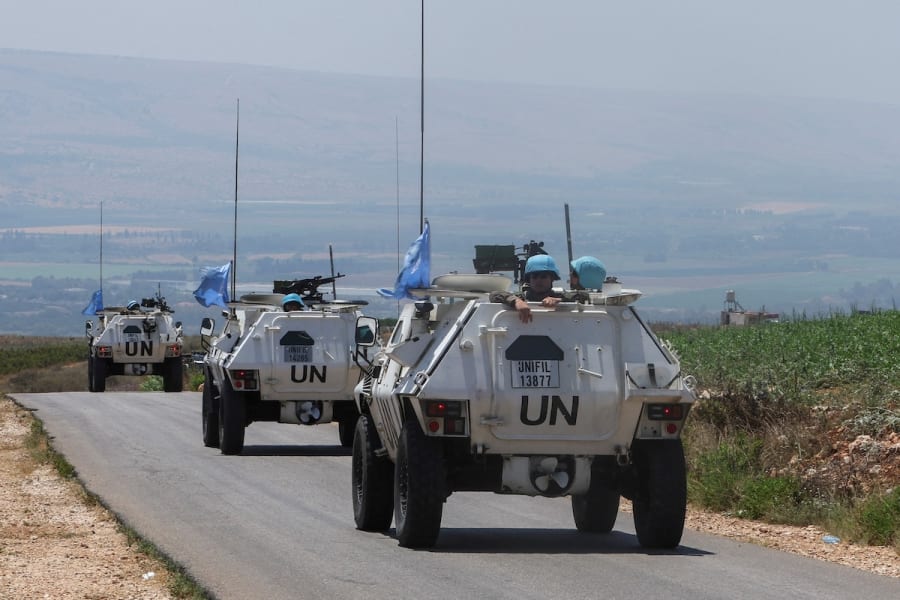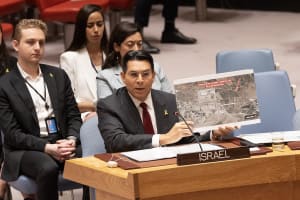UN peacekeeping mission in Lebanon to end in 2026 after final extension granted by Security Council
Lebanon welcomes extension while Israel praises end of mandate

The United Nations Security Council decided to extend the mandate of the UNIFIL peacekeeping force in southern Lebanon for one year for a “final time,” before ordering its orderly withdrawal in 2027.
In a unanimous vote on Thursday, welcomed by both Lebanon and Israel, the council adopted a draft proposal after its sponsor, France, reached a compromise with the United States.
The Trump administration had originally aimed for an immediate shutdown of the peacekeeping force in support of Israel's position.
The resolution instructs “UNIFIL to cease its operations on 31 December 2026 and to start from this date and within one year its orderly and safe drawdown and withdrawal of its personnel, in close consultation with the Government of Lebanon with the aim of making Lebanon Government the sole provider of security in southern Lebanon.”
“For a change, we have some good news coming from the UN,” Israeli UN Ambassador Danny Danon said, praising the decision.
Israel has long criticized UNIFIL, whose mandate was extended after the Second Lebanon War in 2006. While the force was intended to restrict Hezbollah’s activity in the south, in practice it largely stood by as the group expanded and strengthened.
“I want to remind you, 47 years ago, the Security Council decided to send the UNIFIL force to South Lebanon in order to stabilize the region. We all know they failed. Hezbollah took over the region,” Danon noted.
“Today, the Lebanese government has the responsibility to take control of the area and to understand that they have to be there – not Hezbollah, not anyone else.”
The Lebanese government has begun the process of disarming all militias in the country, including Hezbollah. It therefore supported maintaining the UN force for the time being, to help its overstretched military patrol the south.
Accordingly, Lebanese Prime Minister Nawaf Salam thanked French President Emmanuel Macron “for his continuous support for Lebanon on all levels, particularly for the significant efforts made by French diplomacy to ensure the extension of UNIFIL’s mandate,” without mentioning the mandate’s end.
U.S. Ambassador to the UN Dorothy Shea stressed that this would be the last time that Washington would support an extension.
“The security environment in Lebanon is radically different than just one year ago, creating the space for Lebanon to assume greater responsibility,” she told the UN Security Council (UNSC).
Shea called on the international community to increase its support for the Lebanese military over the coming year and “set Lebanon up for success.”
Lebanon’s declaration that it had begun a process to disarm Hezbollah came after heavy U.S. pressure, with White House envoy Tom Barrack recently visiting Beirut to monitor its progress.
Lebanese President Joseph Aoun expressed his hope that the coming 16 months “will be an opportunity to rescue the Lebanese situation and stabilize the situation on our southern borders, and that the additional year would be the fixed deadline for affirming and consolidating Lebanon's sovereignty over its entire territory.”
In a phone call with Macron, Aoun said he saw the mandate extension as “an advanced step that will help the Lebanese army complete its deployment up to the internationally recognized borders, once Israel's complete withdrawal is achieved, hostile actions cease, and Lebanese prisoners are returned.”
Israeli Foreign Minister Gideon Sa’ar praised the UNSC decision and thanked the U.S. for supporting it.
The Foreign Ministry said in a statement that the decision was “in accordance with Israel’s position.”
It further noted that “Over the years, UNIFIL has completely failed to prevent Hezbollah's ongoing military build-up within its area of operations. Likewise, UNIFIL’s reports to the Security Council did not reflect the reality on the ground and the extent of Hezbollah’s build-up, and created a false appearance of stability.”
“Israel appreciates the position of the United States and, in particular, that of Secretary of State Rubio, whose support was instrumental in achieving this outcome. U.S. engagement in fostering a more secure regional environment is welcome and important. Recent developments in Lebanon are encouraging, and Israel will continue to ensure that these achievements are preserved and that the security of our northern residents remains assured.”
Earlier this week, Prime Minister Benjamin Netanyahu's office (PMO) stated that Israel “acknowledges the significant step” of ordering the Lebanese military to begin disarming Hezbollah, calling it “a momentous decision.”
“In light of this important development, Israel stands ready to support Lebanon in its efforts to disarm Hezbollah and to work together towards a more secure and stable future for both nations. If the Lebanese Armed Forces (LAF) take the necessary steps to implement the disarmament of Hezbollah, Israel will engage in reciprocal measures, including a phased reduction of IDF presence in coordination with the US-led security mechanism,” the PMO statement added.

The All Israel News Staff is a team of journalists in Israel.
You might also like to read this:

















